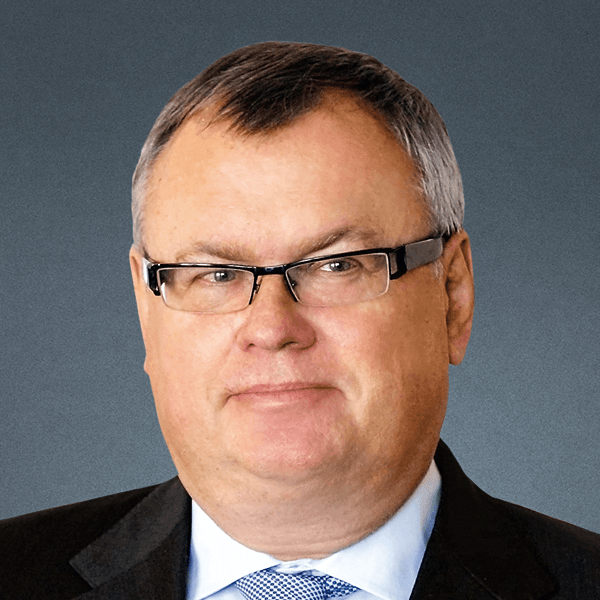by Nicholas Watt
On April 4, 2014 European University at St. Petersburg welcomed VTB chief, Andrey Kostin, to the Golden Hall for his presentation entitled “Russia and Europe: Past, Present, and Future.” Kostin was introduced by Rector Oleg Kharkhordin to an audience of students and professors eager to hear what the head of one of Russia’s leading state banks had to say during this time of tense relations between Russia and Europe.
Kostin’s presentation began with a purview of the shared history of the two regions, and specifically how European influence altered the trajectory of Russian history. Kostin noted that though Christian values were what initially united the two regions, Peter the Great’s dedication to European values and aesthetics pushed Russia closer to Europe. “The Russian upper classes spoke French, read European books, and listened to European music.” The cultural exchange has not been just one way, though. Kostin pointed to major Russian cultural figures and specifically to the impression that the “War and Peace” section of the opening ceremony of the Sochi Olympics made on Western audiences.

Russia’s roughly 70 years of communism, in Kostin’s opinion, was a setback both to the country’s overall development and to its relationship with Europe. During this confrontational period, however, economic ties thrived; Kostin used the historic pipe for gas deal and other examples to illustrate his point. Kostin saw the end of communism as an opportunity for Russia to greatly improve its ties to Europe. How effectively did Russia capitalize on this opportunity?
Kostin’s response to his own question was mixed. He characterized the beginnings of the post-Soviet period as one of great, but overly optimistic goals. Despite the significant trade that has connected Russia and Europe (especially German consumers and French banks), there was much that has hindered increased cooperation. Kostin pointed to the inherent difficulty in transitioning from 70 years of communism, the emergence of a multipolar geopolitical landscape, and the breakdown of trust between Russia and Western nations – the US in particular. The expansion of the EU, NATO, and constant criticism of Russia from the West regarding human rights has further damaged relations.
Kostin then turned to the current situation in Ukraine. Regarding the EU Association agreement, he said that though Russia respects any choice Ukraine makes, Russia is vocal in its opposition to the deal due to the exposure it would bring to the Russian economy. Kostin said that Russia believes what happened in Ukraine in February was a violent seizure of power that violated the legitimate resolution, which had been brokered by EU dipomats, between Yanukovych and the opposition. Kostin conceded that Yanukovych’s regime was poorly managed, but emphasized that Yanukovych was illegally stripped of power, as constitutionally mandated impeachment proceedings never took place. Dangerous radicals hold too much power in Ukraine’s current government according to Kostin, who pointed out that Catherine Ashton (the EU’s foreign secretary) had even been following the Russian government’s position by condemning the Ukrainian radicals in a recent statement.
Kostin found the “silver lining” for the Russian economy in the increased confrontation with the West: Russia could be propelled to diversify both its domestic economy – Kostin noted the need for more high tech industry – and its customer base, with countries such as China, Japan, and South Korea representing increasingly attractive trade partners.
The topic then moved to the US-led sanctions targeting Russian officials, which he viewed as counterproductive. He thought that though the sanctions hurt, they did not represent a point of no return. More sweeping economic sanctions, such as those levied on Iran, would be disastrous, and not only for Russia, but the EU, especially. Kostin found the “silver lining” for the Russian economy in the increased confrontation with the West: Russia could be propelled to diversify both its domestic economy – Kostin noted the need for more high tech industry – and its customer base, with countries such as China, Japan, and South Korea representing increasingly attractive trade partners. He said that Russia needs “reindustrialization”, and noted the increasing trend of manufacturing “coming back home”.
Kostin began finishing up his speech in an optimistic tone, pointing to Russia’s newfound self-confidence. Russia’s ascension to the WTO in 2012 was a big success and the country has begun to take on a more global posture. “The EU is no longer the great pole it was twenty years ago. We should look at a more global picture.” Kostin found that there was also a lot of untapped potential in Siberia, where economic development has become a national priority. Kostin was also optimistic about the prospects of the Eurasian Economic Union set to launch in 2015. The unification of the EU and the Eurasian Economic Union into one free-trade zone was even raised as a possibility in the future. He said that relations between Europe and Russia could be improved by a higher degree of mutual respect.
Question and Answer Session
The floor was then opened up to the audience for questions. The first question related to the position of the Russian state toward the administration currently in Kiev. Kostin answered that Moscow would recognize a fairly elected administration in Kiev: “If properly organized, these elections [in May] will create a legitimate regime.” He emphasized the need for the future regime to represent the interests of the majority of the Ukrainian population. In his answer, Kostin was also highly skeptical of the possibility of Russian military action in Ukraine.
The second question raised doubt about the effectiveness of a Customs Union that did not include Ukraine. Kostin conceded that the Customs Union would be more successful with Ukraine in it, but highlighted the untapped potential in Siberia and South East Asia. Kostin regretted that a formula allowing Ukraine to cooperate in the economic sphere with one – either the EU or Russia – without hurting the other did not exist.
On a broader note, Kostin said that the EU “will never manage to succeed in Ukraine unless there is the support of Russia. Ukraine has a lot of problems but may have more problems if Russia turns its back on Ukraine. Ukraine will really struggle despite Western loans.”
The third question focused on the effect of Russia’s policy in Ukraine on intellectual life. Kostin approached answering from a more economic point of view, while admitting that sometimes Russia’s policy, specifically the manipulation of gas prices, left something to be desired. He thought Russia should do more to “unfreeze the situation”, noting that Western sanctions on Russian banks would be disastrous. He said such sanctions would be more damaging to Russia than vice versa. He brought up the example of Iran, where sanctions had completely isolated the country from the international financial community. He said Russia should move to restore its relationship with the West.
Rector Kharkhordin then asked about the freedom of expression in the working environment of a Russian state company. Kostin answered, “I think we should talk, there should be more dialogue. Some people say we live in a closed society. I think it’s not true”. He said people have free access to travel and information – keys to an open society. Kostin said that he had fired only one person for political reasons, and it was because this individual had posted photos supporting Nazism. “We should develop society with a different and broader opinion,” he concluded his response.
The fifth question was about the relative standards of living in Russia, as compared to Ukraine, and how it related to Crimea. Kostin said that in the 1970s, the Crimean populace enjoyed a much higher than average standard of living, with the beaches, the vineyards, and so on. Kostin said he loves the Crimea, and has been going there during the summer for 15 years and also owns a house there. He’s never had a problem with it being Ukrainian. He said the region is very close to the Russian heart with its literature, culture, and history, and then delved into the economic implications of the current situation. “It’s a fact of life that Russian society is about twice as wealthy as Ukrainian. Many people there will benefit. But some will lose.” On a broader note, Kostin said that the EU “will never manage to succeed in Ukraine unless there is the support of Russia. Ukraine has a lot of problems but may have more problems if Russia turns its back on Ukraine. Ukraine will really struggle despite Western loans.”
The sixth and final question came from a person asking whether or not Russia would implement a national banking system in the case of further sanctions. Kostin said that it should not be “tit for tat” and that Russia could reasonably implement such a system – if banks such as his or Sperbank were sanctioned – within two months or so in order for Russians to be able to make payments. He said Russia could create its own card system in addition to Visa, but he was skeptical of its international acceptance and brought up the case of the Chinese card, which can only be used in some very high-end stores. Kostin warned that Russia should not get rid of Visa or Mastercard.
After this answer, Kharkhordin interjected that Kostin had a flight to catch and with that, the audience applauded and the presentation was over.
Nicholas Watt is an ENERPO alumnus and the editor-in-chief of the ENERPO Journal.

